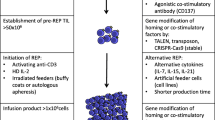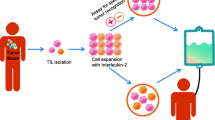Abstract
Adoptive cell transfer (ACT) of in vitro expanded tumor-infiltrating lymphocytes (TIL) for the treatment of patients with advanced stages of metastatic melanoma remains one of the most beneficial therapies eliciting long-lasting responses. Methods and protocols used to expand TIL have evolved over time, utilizing different culture devices and other tools, to streamline and maximize the end product in both numbers and quality. Summarized in this chapter are the latest protocols used in the TIL program at MDACC.
Access this chapter
Tax calculation will be finalised at checkout
Purchases are for personal use only
Similar content being viewed by others
References
Dudley ME, Wunderlich JR, Yang JC et al (2005) Adoptive cell transfer therapy following non-myeloablative but lymphodepleting chemotherapy for the treatment of patients with refractory metastatic melanoma. J Clin Oncol 23(10):2346–2357. https://doi.org/10.1200/JCO.2005.00.240
Besser MJ, Shapira-Frommer R, Itzhaki O et al (2013) Adoptive transfer of tumor-infiltrating lymphocytes in patients with metastatic melanoma: intent-to-treat analysis and efficacy after failure to prior immunotherapies. Clin Cancer Res 19(17):4792–4800. https://doi.org/10.1158/1078-0432.CCR-13-0380
Radvanyi LG, Bernatchez C, Zhang M et al (2012) Specific lymphocyte subsets predict response to adoptive cell therapy using expanded autologous tumor-infiltrating lymphocytes in metastatic melanoma patients. Clin Cancer Res 18(24):6758–6770. https://doi.org/10.1158/1078-0432.CCR-12-1177
Goff SL, Dudley ME, Citrin DE et al (2016) Randomized, prospective evaluation comparing intensity of lymphodepletion before adoptive transfer of tumor-infiltrating lymphocytes for patients with metastatic melanoma. J Clin Oncol Off J Am Soc Clin Oncol 34(20):2389–2397. https://doi.org/10.1200/JCO.2016.66.7220
Tavera RJ, Forget MA, Kim YU et al (2018) Utilizing T-cell activation signals 1, 2 and 3 for tumor-infiltrating lymphocytes (TIL) expansion: the advantage over the sole use of interleukin-2 in cutaneous and uveal melanoma. J Immunother 41(9):399–405. https://doi.org/10.1097/CJI.0000000000000230
Chacon JA, Sarnaik AA, Chen JQ et al (2015) Manipulating the tumor microenvironment ex vivo for enhanced expansion of tumor-infiltrating lymphocytes for adoptive cell therapy. Clin Cancer Res 21(3):611–621. https://doi.org/10.1158/1078-0432.CCR-14-1934
Harao M, Forget MA, Roszik J et al (2017) 4-1BB-enhanced expansion of CD8+ TIL from triple-negative breast cancer unveils mutation-specific CD8+ T cells. Cancer Immunol Res 5(6):439–445. https://doi.org/10.1158/2326-6066.CIR-16-0364
Sakellariou-Thompson D, Forget MA, Creasy C et al (2017) 4-1BB agonist focuses CD8(+) tumor-infiltrating T-cell growth into a distinct repertoire capable of tumor recognition in pancreatic cancer. Clin Cancer Res 23(23):7263–7275. https://doi.org/10.1158/1078-0432.CCR-17-0831
Forget MA, Haymaker C, Dennison JB et al (2016) The beneficial effects of a gas-permeable flask for expansion of tumor-infiltrating lymphocytes as reflected in their mitochondrial function and respiration capacity. Onco Targets Ther 5(2):e1057386. https://doi.org/10.1080/2162402X.2015.1057386
Dudley ME, Gross CA, Langhan MM et al (2010) CD8+ enriched "young" tumor infiltrating lymphocytes can mediate regression of metastatic melanoma. Clin Cancer Res 16(24):6122–6131. https://doi.org/10.1158/1078-0432.CCR-10-1297
Somerville RP, Devillier L, Parkhurst MR et al (2012) Clinical scale rapid expansion of lymphocytes for adoptive cell transfer therapy in the WAVE(R) bioreactor. J Transl Med 10:69. https://doi.org/10.1186/1479-5876-10-69
Jin J, Sabatino M, Somerville R et al (2012) Simplified method of the growth of human tumor infiltrating lymphocytes in gas-permeable flasks to numbers needed for patient treatment. J Immunother 35(3):283–292. https://doi.org/10.1097/CJI.0b013e31824e801f
Forget MA, Malu S, Liu H et al (2014) Activation and propagation of tumor-infiltrating lymphocytes on clinical-grade designer artificial antigen-presenting cells for adoptive immunotherapy of melanoma. J Immunother 37(9):448–460. https://doi.org/10.1097/CJI.0000000000000056
Riddell SR, Watanabe KS, Goodrich JM et al (1992) Restoration of viral immunity in immunodeficient humans by the adoptive transfer of T cell clones. Science 257(5067):238–241
Dudley ME, Rosenberg SA (2003) Adoptive-cell-transfer therapy for the treatment of patients with cancer. Nat Rev Cancer 3(9):666–675. https://doi.org/10.1038/nrc1167
Acknowledgments
The authors would like to thank all past and present members of the Clinical and Research TIL lab at MD Anderson Cancer Center. We would also like to thank the Stem Cell Transplantation and Cellular Therapy (SCTCT) Lab as well as the Center for Cancer Immunotherapy Research (CCIR) Regulatory Compliance Unit. The authors would like to thank Bristol Myers Squibb for their generous contribution with the agonistic anti-4-1BB antibody (BMS-663513) as well as Prometheus for kindly providing the IL-2 used in this study and the clinical work.
Conflict of Interest: The authors declare no conflicts of interest.
Author information
Authors and Affiliations
Corresponding author
Editor information
Editors and Affiliations
Rights and permissions
Copyright information
© 2022 The Author(s)
About this protocol
Cite this protocol
Fulbright, O.J., Forget, MA., Haymaker, C., Bernatchez, C. (2022). Isolation and Maintenance of Tumor-Infiltrating Lymphocytes for Translational and Clinical Applications: Established Methods and New Developments. In: McAllister, F. (eds) Cancer Immunoprevention. Methods in Molecular Biology, vol 2435. Humana, New York, NY. https://doi.org/10.1007/978-1-0716-2014-4_5
Download citation
DOI: https://doi.org/10.1007/978-1-0716-2014-4_5
Published:
Publisher Name: Humana, New York, NY
Print ISBN: 978-1-0716-2013-7
Online ISBN: 978-1-0716-2014-4
eBook Packages: Springer Protocols




